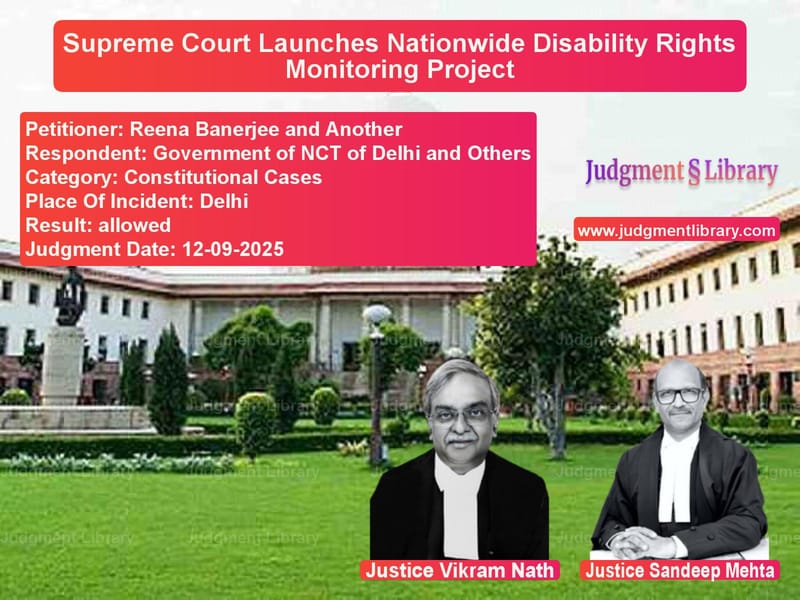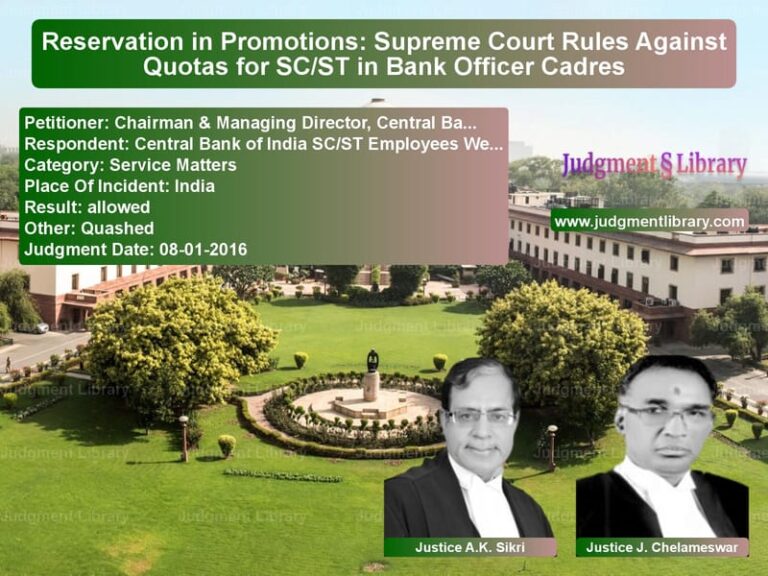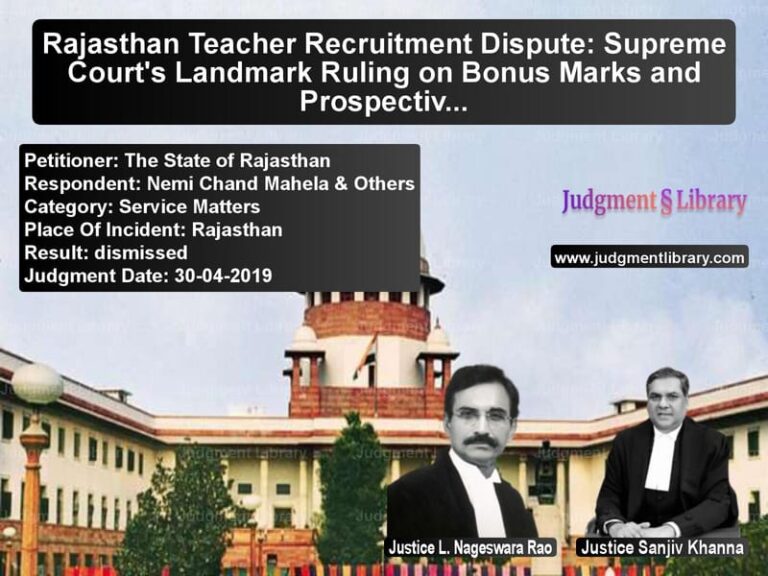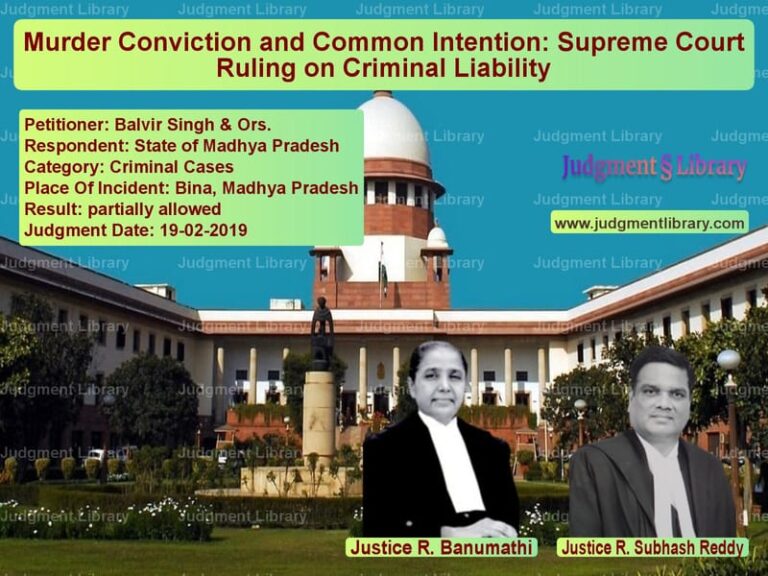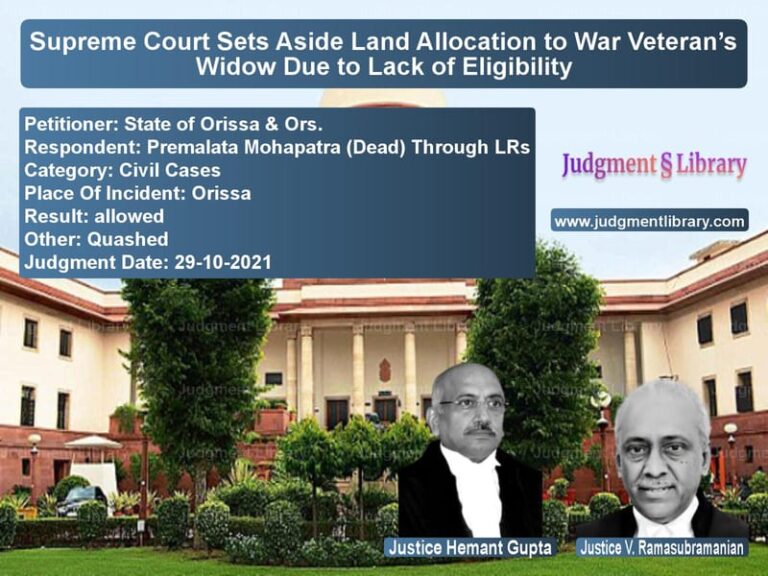Supreme Court Launches Nationwide Disability Rights Monitoring Project
In a landmark judgment that reaffirms India’s commitment to disability rights, the Supreme Court has launched a comprehensive nationwide monitoring initiative to assess the conditions in state-run care institutions for persons with cognitive disabilities. The case, which combines two separate petitions filed over decades, represents one of the most significant judicial interventions in the realm of disability rights in India’s history. The Court’s decision comes after years of documented non-compliance by state governments and union territories with existing disability laws, despite repeated judicial directives.
The litigation originated from two separate cases – a Writ Petition filed in 1998 by the Justice Sunanda Bhandare Foundation seeking implementation of the Persons with Disabilities Act, 1995, and a subsequent case filed by Reena Banerjee concerning the pitiable conditions at Asha Kiran, a state-run care institution in Delhi for persons with cognitive disabilities. The Court noted with concern that despite previous judgments in 2014 and 2016 directing compliance with disability laws, most states and union territories had failed to implement the necessary measures, demonstrating what the Court described as “a lackadaisical approach towards compliance with statutory mandate and judicial directions.”
The Philosophical Foundation
The judgment begins with a powerful philosophical framing of disability rights, stating that “Disability represents a fundamental aspect of human diversity that transcends medical definitions to encompass critical questions of constitutional democracy and social justice.” The Court emphasized that disability should not be viewed as a deficit requiring correction but as “a lens that reveals the true nature of legal, social, and institutional frameworks, illuminating whether they embrace human diversity or create barriers that exclude certain members of society.”
This perspective represents a significant shift from the traditional medical model of disability to the social model, which recognizes that barriers in society, rather than individual impairments, are the primary obstacles faced by persons with disabilities. The Court articulated that “The principle of accessibility and reasonable accommodation emerges as a fundamental constitutional principle, not merely a technical requirement, but a measure of democratic inclusivity that determines whether all citizens can exercise their constitutional rights meaningfully.”
The Asha Kiran Case and Systemic Failures
The case concerning Asha Kiran Home revealed shocking conditions in state-run care institutions. The institution, meant to provide care and protection for persons with cognitive disabilities, was found to be overcrowded, with inadequate medical care, poor hygiene, and instances of abuse, particularly of female residents. The Court noted that residents arrived with complex health and emotional needs, many having experienced homelessness, abandonment, or trauma, and displayed a range of impairments including intellectual disabilities, cerebral palsy, and other cognitive disability conditions.
An Advisory Group Expert Panel appointed by the Court submitted a comprehensive report titled “Asha Kiran as Microcosm of What Ails India’s Care Support Structure,” which documented these conditions and provided detailed recommendations for reform. The report observed that overcrowding had contributed to the spread of infections and suggested decongestion as a key health intervention. It also highlighted that many residents required regular medication for epilepsy, psychiatric disorders, and chronic illnesses, but the institution lacked adequate healthcare infrastructure.
Project Ability Empowerment
In response to the documented failures and ongoing non-compliance, the Supreme Court launched “Project Ability Empowerment,” a massive nationwide monitoring exercise to be conducted by eight National Law Universities across India. Each university has been assigned specific states and union territories to monitor, ensuring comprehensive coverage of the entire country.
The monitoring will extend beyond physical conditions to assess whether institutional structures respect the autonomy, equality, and dignity of persons with disabilities as guaranteed under the Indian Constitution. The Court directed that “the monitoring shall also extend to examining the implementation of the RPwD Act” and cover both state-run and private institutions housing persons with cognitive disabilities.
The Court allocated significant resources for this project, directing that “all expenses incurred by the monitoring teams of the NLUs in the course of preparing and submitting their reports shall be borne in equal proportion by the Department of Empowerment of Persons with Disabilities, Ministry of Social Justice and Empowerment, Government of India, and the Social Justice Department of the concerned States/Union Territories.” The Union of India was directed to provide an interim project fund of Rs. 25 lakhs to each of the eight designated National Law Universities.
Comprehensive Monitoring Framework
The Court outlined an extensive monitoring framework covering six key areas: resident profiling and rehabilitation; accessibility and education; rights protection and compliance; staffing and resources; documentation and welfare access; and reservation policies.
Under resident profiling, the monitoring teams will conduct comprehensive mapping of each resident, including their age, gender, disability profile, medical history, family background, and psychosocial needs. The Court emphasized the need for “exit pathways and mechanisms for community integration,” including efforts to trace families, assess possibilities for family reunification, and facilitate transfer to community-based alternatives.
The accessibility audit will evaluate physical environments, transportation, and communication channels, while the educational assessment will examine whether children are enrolled in schools and adults have access to skill training. The Court specifically noted that “State-run Institutions should be asked to demonstrate how they are implementing the right to education, functional literacy, and vocational rehabilitation under the RPwD Act and the National Education Policy, 2020.”
Revolutionizing Reservation Policies
In a significant development, the Court addressed a critical issue in reservation policies for persons with disabilities. The judgment highlights that “the same treatment is not provided to persons with disabilities protected under the RPwD Act, who, in spite of standing higher in merit, are denied such upward movement.” This refers to the practice where meritorious candidates from reserved categories who score above the general cutoff are typically moved to the unreserved category, freeing up reserved seats for other candidates from the same category.
The Court found that “the direct consequence of not providing upward movement to the meritorious candidate(s) applying under the category of persons with disabilities would be that even when a candidate with disability scores higher than the cut-off for the unreserved category, such a candidate would invariably occupy the reserved seat, thereby denying the opportunity to a lower scoring candidate with disability.” The Court characterized this as “a glaring example of hostile discrimination against persons with disabilities” that “defeats the very purpose of reservation under Section 34 of the RPwD Act.”
The Court directed the Union of India to explain whether appropriate measures have been taken to provide upward movement for meritorious candidates with disabilities and emphasized that “the same principle must also be applied to promotions.”
Constitutional Vision and Future Directions
The judgment concludes with a powerful reaffirmation of constitutional values, stating that “The dignity of persons with disability, especially those institutionalised and forgotten, cannot be made contingent upon their perceived ability to integrate, perform, or comply with dominant norms of independence.” The Court emphasized that “A truly inclusive constitutional vision must move beyond these binaries and recognise that the right to equality is not contingent on capacity but anchored in dignity, autonomy, and the right to belong, on equal terms, in every domain of life.”
The monitoring institutions have been directed to commence their work within four weeks and submit a detailed consolidated report within six months. The matter has been listed for March 13, 2026, for receiving the comprehensive report, which will include actionable recommendations for systemic reforms and transition toward community-based alternatives.
This judgment represents a watershed moment in India’s disability rights jurisprudence, establishing a robust framework for accountability and implementation of disability laws. By launching Project Ability Empowerment, the Supreme Court has created an unprecedented mechanism to ensure that the constitutional promises of equality, dignity, and inclusion become a reality for all persons with disabilities in India.
Petitioner Name: Reena Banerjee and Another.Respondent Name: Government of NCT of Delhi and Others.Judgment By: Justice Vikram Nath, Justice Sandeep Mehta.Place Of Incident: Delhi.Judgment Date: 12-09-2025.Result: allowed.
Don’t miss out on the full details! Download the complete judgment in PDF format below and gain valuable insights instantly!
Download Judgment: reena-banerjee-and-a-vs-government-of-nct-of-supreme-court-of-india-judgment-dated-12-09-2025.pdf
Directly Download Judgment: Directly download this Judgment
See all petitions in Fundamental Rights
See all petitions in Public Interest Litigation
See all petitions in Reservation Cases
See all petitions in Education Related Cases
See all petitions in Judgment by Vikram Nath
See all petitions in Judgment by Sandeep Mehta
See all petitions in allowed
See all petitions in supreme court of India judgments September 2025
See all petitions in 2025 judgments
See all posts in Constitutional Cases Category
See all allowed petitions in Constitutional Cases Category
See all Dismissed petitions in Constitutional Cases Category
See all partially allowed petitions in Constitutional Cases Category

